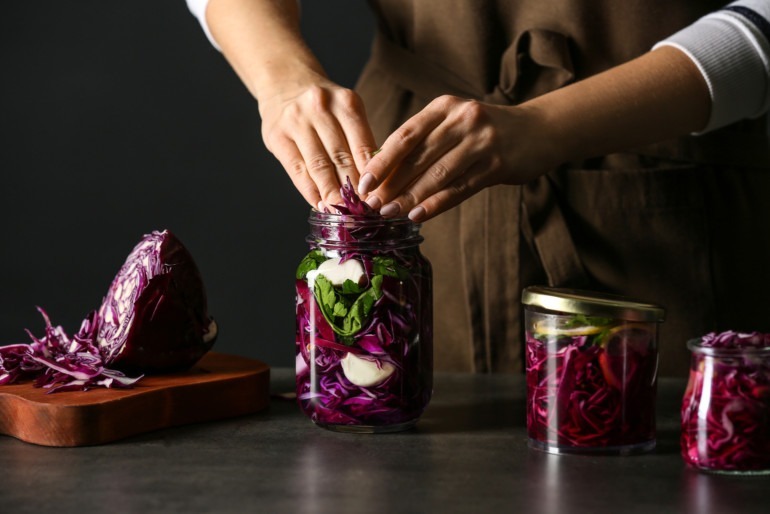As you likely learned at some point in your education, bacteria are central players in human health. They can be bad actors, carriers of diseases like botulism and pneumonia, or be beneficial, helping us thrive. Science is learning more every day about the balance needed, both outside and inside our bodies, for optimum health. Certain streptomyces bacteria, for example, are noted for their ability to produce broad-spectrum antibiotics. Many other strains of beneficial bacteria are desirable in the human gut as they inhibit the growth of other microorganisms.
That’s where fermented foods come in: They help boost your microbiome. (“Gut biome” or “microbiome” refers to the collection of microorganisms that live in our digestive tract.) Nan Foster, a Ross-based integrative health coach specializing in functional medicine and author of Gutsy: The Food-Mood Method to Revitalizing Your Health Beyond Conventional Medicine, notes that three-fourths of our immune system lives in the digestive system, making what we eat not only the most important tool in managing our gut biome, but a tool of utmost importance to our overall health.
How Fermentation Supports Immune Function
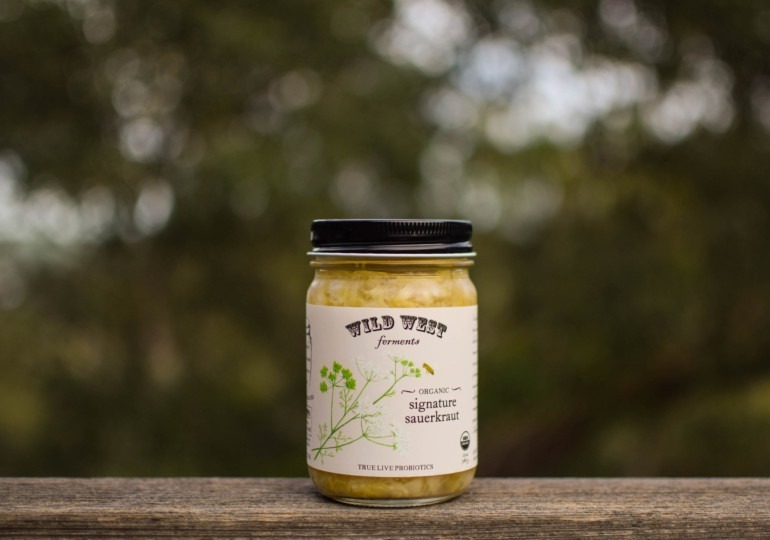
Foster explains how it works. “Afferent nerves, including the vagus nerve, are used by the microbiome to communicate with the brain,” she says. Yep, you heard that right: Our guts communicate directly with our brain. “Microbiome health affects all parts of our bodies, including our psychology,” Foster continues. “There’s a lot we don’t understand about what is running us, but do know that we want a healthy flourishing microbiome. The gut-immunity connection helps keep us well.”
Without going full Kant on the philosophical interpretation of “you are what you eat,” think instead about what you should eat for immune health and well-being. Foods such as the pickles and kimchi from Point Reyes Station-based Wild West Ferments, alive with the beneficial bacteria that naturally occur in Marin, Sonoma and Northern California, are a good start. “We do not inoculate,” says owner Luke Regalbuto, who runs the business with his wife and co-owner, Maggie Levinger. The wild ferment, plus time, results in a competitive environment that develops a variety of bacteria “but primarily lactobacillus,” Regalbuto says. “Salt inhibits the ability of yeast to survive, so the ferment is mostly lactic acid bacteria that disfavors the other pathogenic bacteria that promotes spoiling,” Levinger adds.
Diverse Ecosystems Benefit Health
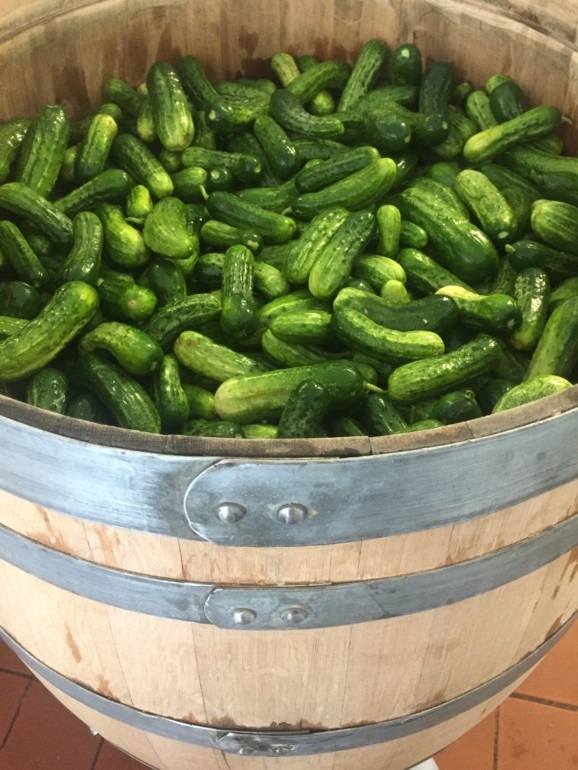
In the ecosystem of a ferment done right, the good guys win. For gut health, we similarly want that ecosystem, that diversity of beneficial bacteria. The good actors provide strength in diversity. “It’s part of this dance — we’re engaging with this unseen part of the natural world,” Regalbuto says. “The season, soil and pack date all add up to a unique relationship that brings our guts into a symbiotic relationship with the soil that grows our food.”
Living foods like sauerkraut age safely over time when stored properly, but the taste does change as the ecosystem changes. “Older krauts aren’t more sour,” Regalbuto says. It’s more about funkiness, a softer texture and a deeper, more complex flavor. The bacteria that produce the majority of the sour flavor are the ones that come in first and secure their future by making acid, the lactic acid-forming bacteria. Each ferment has different bacterial species that thrive at different stages of the product lifecycle.”
Finding the Balance
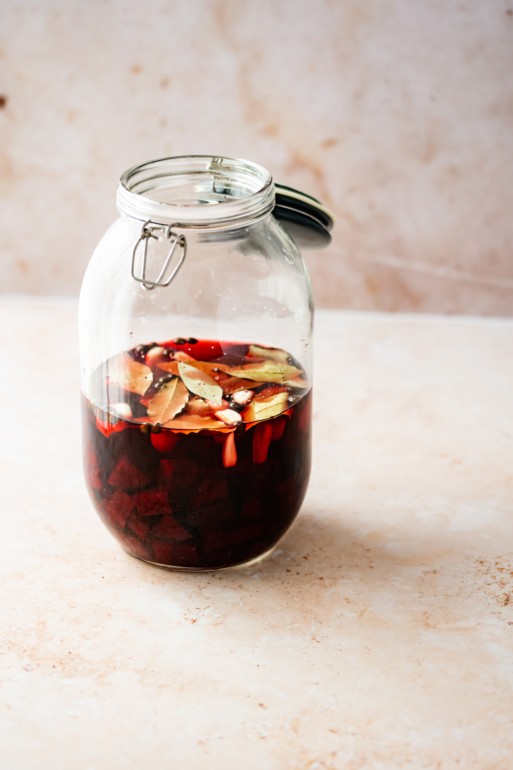
Stanford Medicine recently published a study noting that a diet high in fermented foods boosts microbiome diversity and improves immune responses. Foster notes that a depleted microbiome, common in Americans who eat a Western diet or the standard American diet, shows up everywhere: joint pain, brain fog, poor nutritional absorption and even inflamed skin. “It can show up anywhere in the body,” she says. However, there is no single food she recommends to people who arrive at her clinic. “In general, I want them to eat lots of vegetables and lots of real whole foods that look on your plate like they do in nature.”
While she loves fermented foods for their built-in probiotics, adding them can make a problem worse. “The person might not be ready for probiotics,” Foster says. “We first have to address what might be an infectious situation or address a leaky gut, food sensitivities, etcetera.” Her process to rebuild a healthy biome involves a five-step program that first works to remove any harmful foods and bacteria, and then repairs any damage before “re-inoculating” with pre- and pro-biotics and fermented foods as a final step in rebalancing.
Small Steps to Feeling Better

Small steps can make a big difference in any rebalancing effort. Native Marinites Dylan and Anna Lundstrom, husband-and-wife cofounders of hard kombucha brand Folksy, started drinking the beverage after their first baby was born as a way to feel better than they felt after drinking wine or beer. Dylan, who holds a Master of Science degree in viticulture and enology, notes that the initial ferment of kombucha includes a laundry list of active bacteria that drive the conversion of sugar to alcohol. While this is arguably where the health benefits come from, he notes that there is plenty of debate around hard kombucha and health benefits. “We take that base and go to a second fermentation, carried out by yeast, which consumes sugar to create ethanol that we take to 5%,” he says. “It’s ‘better-for-you alcohol,’ fun to drink, and not as heavy to process with low pH and alcohol presence. Like Wild West Ferments, the Lundstroms do not pasteurize their product. The alcohol inhibits some bacterial growth, working as a preservative. Refrigeration is recommended to slow down the bacterial growth and product change but does not stop it.
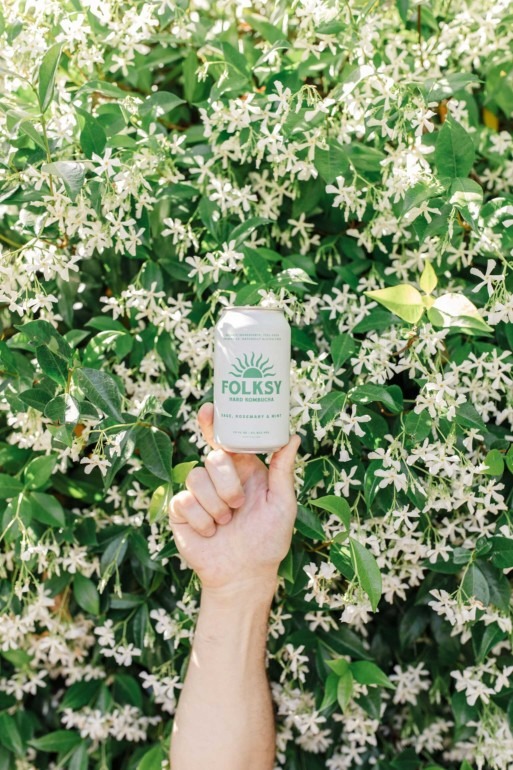
The Lundstroms’ mindful brewing practices keep the pH between 3.3 and 3.5, refining the acid levels to make the solution challenging for any molds or bad actors. “The low pH also helps with stability — we work with a low pH, lower alcohol, active microbiology and a simple ingredient list,” Lundstrom says.
Eat Plenty of Fiber
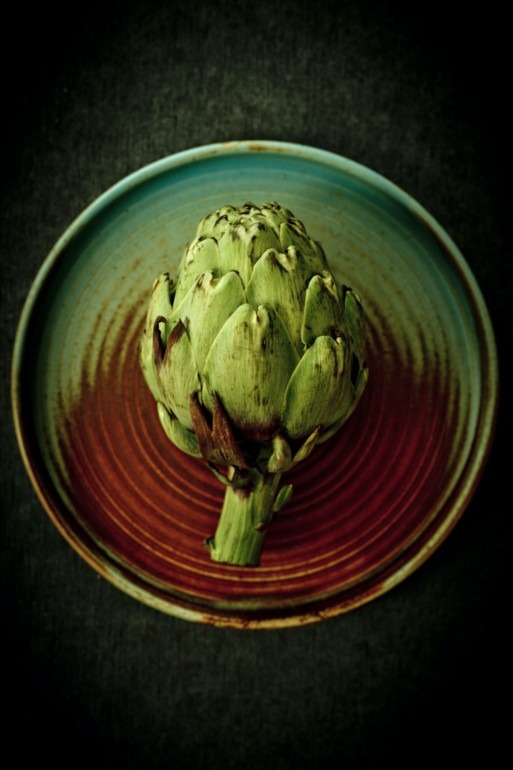
While all sorts of beneficial bacteria support a healthy microbiome, a diet that’s based on diverse foods and fiber, especially resistant starches that ferment in the large intestine, is best to support good actors, Foster says. “Prebiotic fibers including artichokes, lentils, inulin and green bananas promote the growth of probiotics.” Regalbuto notes that as fermented foods age, their flavors change — the new generations of bacteria continue to utilize foods’ fiber, as well as the nutrition generated by the original bacteria generations to thrive. “The bacteria that make the majority of the sour flavors come in first and secure their future by making acid,” Regalbuto says. “They’re lactic acid-forming bacteria. There are different species through the lifecycle of the product.”
That kombucha or kraut may become a little softer in texture over time, but the health benefits may also become even greater. Science’s knowledge about the health benefits of fermentation continues to evolve. Striving for a diet that supports gut health has proven benefits. How funky you like your cabbage, however, is a discussion for another time.
For more on Marin:
- Is Aduhelm the Drug Alzheimer’s Patients Have Been Waiting for? Buck Institute Scientists Weigh In
- Strengthen Your Immune System, Boost Energy and Improve Your Mental and Physical Health With a Massage at HELLO Modern Massage
- Spotlight: The Bay Fitness Brings the Gym to You, Offering Personal Training Right In Your Home
 Christina Mueller is a long-time Bay Area food writer. She hails from the East Coast and has spent way too much time in South America and Europe. She discovered her talent as a wordsmith in college and her love of all things epicurean in grad school. She has written for Condé Nast Contract Publishing, Sunset, and the Marin Independent Journal, among others. She volunteers with California State Parks and at her child’s school, and supports the Marin Audubon Society, PEN America, and Planned Parenthood. When she is not drinking wine by a fire, she is known to spend time with her extended family.
Christina Mueller is a long-time Bay Area food writer. She hails from the East Coast and has spent way too much time in South America and Europe. She discovered her talent as a wordsmith in college and her love of all things epicurean in grad school. She has written for Condé Nast Contract Publishing, Sunset, and the Marin Independent Journal, among others. She volunteers with California State Parks and at her child’s school, and supports the Marin Audubon Society, PEN America, and Planned Parenthood. When she is not drinking wine by a fire, she is known to spend time with her extended family.

